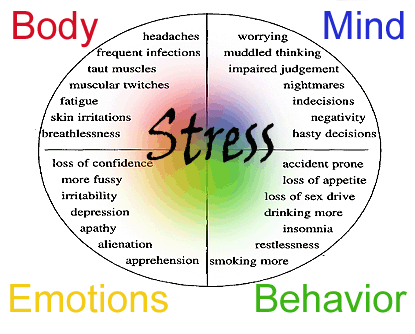The word “stress” is commonly used and broadly defined. Stress is often considered a feeling of being overwhelmed or tired from many interests and concerns. Specifically it is defined as an “…emotional experience accompanied by predictable biochemical, physiological and behavioral changes.”(Baum 1990) Thus when a lapse of emotional stability occurs, stress in one’s life has a lot to do with it.
Stress will simultaneously invoke the fear circuitry system in a person when a threat is perceived. Consider the example of being awakened during the night to a sudden an unfamiliar sound in your home. You may spend a few moments orienting yourself to your surroundings, while slowly walking toward the sound. Your heart rate and breathing speed up as do your thoughts pertaining to “what is going on?” These physical responses are caused by the release of chemical category known as catecholamines such as noradrenaline and adrenaline from the adrenal gland that create cortisol. Cortisol ignites the hippocampus, the amygdala and the prefrontal cortex of the brain resulting in the human “stress response”. The symptoms of which is that fear, rapid heartbeat and breathing you experience as you walk toward the unknown sound. You are on alert! As you enter the room where the source of the sound emanates, you locate the source of the sound and no longer have that sense of fear which quickly becomes extinct. Your heart and breathing return to a normal rhythm. This process is also known as fear extinction. What is important to know is that everyone experiences the process of fear response and fear extinction.
Yet with individuals who have been exposed to ongoing trauma(s), this process is impaired. There is no return to a normal heartbeat and breathing patterns. This is evident when the past trauma(s) is recalled by a current trigger and the person presents in a current state of fear and panic. It’s real and automatic and has all to do with stress.
